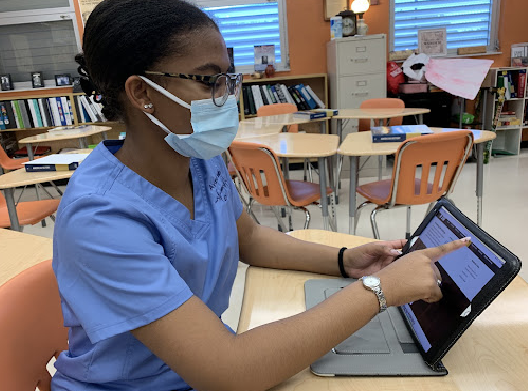College applications pose barriers for underprivileged students
by Izabella Perez

LOOKING FOR MORE: Senior Ayanna Willis researches Florida International University as a future college prospect for her desired major in gynecology. Willis has filled out most forms necessary but is still working to complete them all and looking for more possible colleges. Photo by Izabella Perez
Before becoming a senior, the date of Nov. 1 has drilled a fear inside of you. Relying on prior knowledge and possible help from older siblings, low-income minorities have a harder time filling out applications due to barriers that may not be present for their white and wealthy counterparts.
Students, especially first-generation, with immigrant families applying for college have a harder time with the college application process. Without guidance from a family member or older sibling with experience, navigating websites like CommonApp or Free Application for Federal Student Aid can be extremely confusing.
Many of the college-specific programs and details can be lost to these students because of their first-generation status. According to a report completed by Institute for Higher Education Policy, “students who submit early decision applications receive a boost in their admission chances simply because they can apply early,” a luxury low-income students may not have. Options like early decision, early admission and dual enrollment can be missed by students who do not know that there are other ways to prepare for college.
Without guidance from family, many look to counselors to assist with the process. The main issue with this is one-on-one college counselors are expensive, costing $250 for a one hour session and most having packages that cost upwards of $6,000, according to MassMutual. Although these schools have counselors and advisors, many high schools only house one counselor to help an entire graduating class, causing information and help to be spread thin. West Broward is lucky to house two college counselors, even though it is for graduating classes of nearly 600 students, as other schools in Florida only house one. Harvard researcher Christine Mulhern found that counselors matter most for low-income students as they are less likely to receive college information from their parents.
Coming from an immigrant family and being a first-generation student, my struggles with college applications are slightly better than my older sisters. Being the third oldest in my immediate family, I had to watch my older sisters go through the college application process. My eldest sister, the first child to go to college in my family, had it the hardest. The process was completely foreign to her. My parents offered as much help as they could, but with an immigrant father and mother who is not a Florida native, it was minimal. When it was time for my second oldest sister to apply, my eldest helped as much as she could. Now that I am applying for college, not even all of their help will be enough to make up for the gap we have compared to those with a background of privilege.
Many U.S. first-born students of immigrant families are the first to be fluent in glish, making parents unable to understand their child’s necessary documents. The U.S. Department of Education’s Office of Civil Rights issued guidance in 2015 on the legal obligation of schools to communicate with parents in languages they understand. Despite this, parents are often dependent on their first-born’s ability to read and understand English.
With these resources unavailable to underprivileged students, filling out college applications becomes much more difficult than the average student’s. Research shows that the best way to combat this is for schools to offer more chances to kids to learn about their college opportunities and get more counselors on campus that will be able to tend to more students’ needs. Broward County schools refer to their college and curriculum counselors as Broward Advisor for Continuing Education. Referring to these advisors as college and curriculum counselors county wide can help with confusion that there is not someone on campus to help. If we had more counselors and staff available to assist confused students, Nov. 1 will no longer hold the same heavy dread and anxiety every year. I am glad that the process has gotten better, and I have hope it will only improve by my little sisters’ time.
